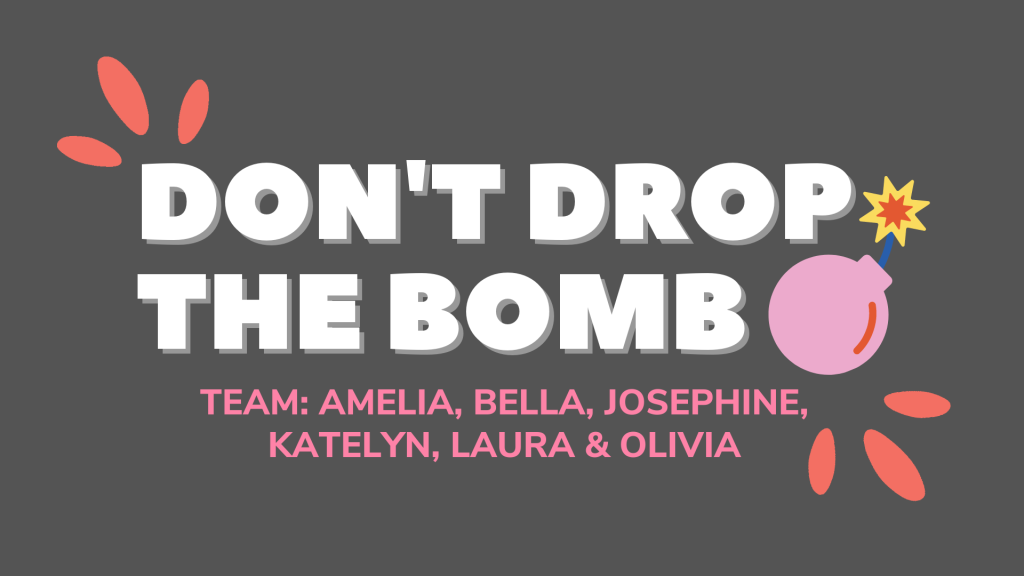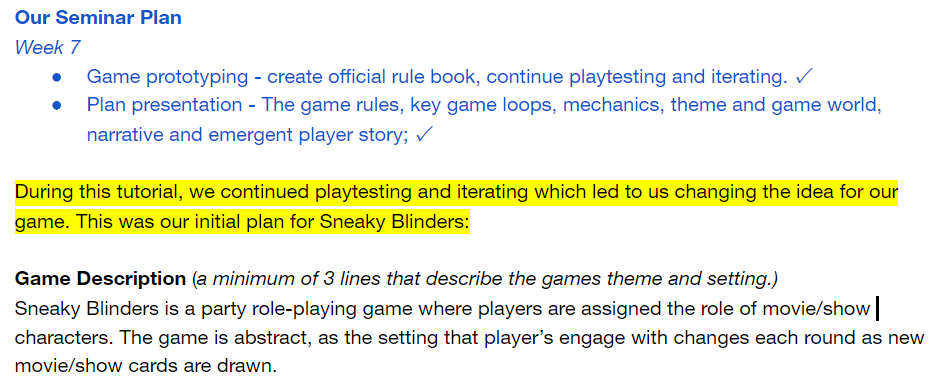The creation and development of an original game is not as easy as it may seem. After conducting rapid ideation, playtesting and a market analysis, our collaborative efforts saw the formation of our abstract game ‘Don’t Drop the Bomb’.

As a larger group of six, thoughts were discussed at the beginning of our designing process was made easy once we all discovered we would prefer to carry out the prototype of a card game. We contemplated various themes from mystery to pop culture and originally settled on a game resulting similarly to the strategy card game ‘Spyfall’. This prototype was initially developed under the name ‘Sneaky Blinders’, a mix of strategy, mystery and pop culture references as the theme of the game.

Although, for such a technical game with a lot of mechanics, we found it hard to create a game that did not align too considerably to other established games. Eventually, we came to the decision to abandon the game in its entirety, as we kept coming to excessive problems and no reliable resolutions.
The decision to scrap the game was a difficult one, as we tried to incorporate varying mechanics and genres to keep to the theme and ideology we had originally developed. Although, I believe once we had eliminated all existing mechanics, it was easy to develop our game ‘Don’t Drop the Bomb’, as a simple, cohesive, although strong game.
The premise of ‘Don’t Drop the Bomb’ involves word association, strategy and creativity. The idea of developing a word association game came after discussing a trend on TikTok. After this discussion, we undertook research that led us to similar games that we could research to help our iterative efforts, including the games, ‘Blank Slate’, ‘Decrypto’ and ‘Monikers’. In addition, playtesting various games in class like ‘Codenames’ enhanced our knowledge of mechanics and ability for development.


We started our iteration using post it notes, exchanging words associated with a word Amelia had written down. We then progressed this prototype to bring in the use of whiteboards, established word cards, and a sand timer.


When it came to deciding on a theme, we concluded that ‘Don’t Drop the Bomb’ fitted more in the realm of an abstract game. Looking into this further for my section of the presentation, it can defined as abstract as there is no particular theme, and the experience of playing is more important. Our game involves the competition between two teams, moving alternatively between each to gain an advantage and defeat the other team through strategy. An element of luck is also involved and exercises logical thought and decisive thinking.
I was also tasked with the narrative & emergent player story component of the presentation. After watching weekly lectures and completing readings on the subjects, the player experience is extremely valuable in developing the narrative of the game. I was able to gather the importance of winning and losing being able to provide valuable skills to enhance learning and critical thinking and the ability to learn from prior mistakes or alternatively to learn new skills. In addition, it can jumpstart the creative flow of thinking and allow players to think outside of the box. Essentially, all elements that can be critical in the process of character building.
As we have a larger group of six students, we found it hard for all to be in attendance at each seminar. For this reason, we opened the lines of communication and encouraged the use of a group chat over Facebook and recording our iterations through a collaborative Group Journal. Employing the use of a group journal, encouraged by our tutor, was extremely helpful in understanding each iteration. Josephine, ensured the Journal was kept updated with thorough information and resources discussed during each seminar.

Playtesting overall went well.
We exchanged games with the table adjacent to us, and as they were so close, we could hear how the game was being played. We weren’t overly prepared for our playtesting, apart from the physical elements brought in by Bella, however, we didn’t think to write the rules down (which ironically should be rule number one).
After a verbal explanation from myself and Bella, of our game’s simple rules and mechanics, we believed we had explained our game simply but effectively. It wasn’t until additional players entered to the initial rule learners, that it became more of a game of Chinese whispers. I saw myself jumping in a small number of times to make sure the game was being learnt and played effectively.
Due to the miscommunication, you could hear the newer players express their dis-interest and confusion for the game. For which at times, was a bit disheartening, but also completely understandable. After helping interpret and encourage the game of play, we could then hear laughter and see smiles, as well as some exclamations of a fun game.
This was good to hear as the mechanics of our game is very simple and was mentioned within the feedback that returned. Following this we play tested our own game to ensure all elements and mechanics were coherent and effective.
After our own playtesting, we determined that ‘Don’t Drop the Bomb’ could be held either in the party or educational game genre. Party game as for constant engaging competition, and educational to develop critical thinking skills and vocabulary expansion. With the further development and potential for expansion packs, niche markets could be formed.
For the presentation element of the project, we made the decision to divide section up and play to our strengths.
Me: The game rules, key game loops, mechanics, theme and game world, narrative, and emergent player story.
Bella: The game overview, including it’s genre and intended audience,
Josephine: integrating knowledge gained from subject lectures and materials;
Katelyn: Evidence of background research
Laura: Arguments about its potential in the marketplace;
Amelia: The playtesting experience and response to feedback through iteration.
We all created audio and visual aspects for each designated part, once that was completed, I volunteered to produce the ten-minute presentation and submit.
Overall, I am happy with the end result of our game and the collaborative efforts from the group. I know for myself; the iteration process has helped my own critical and creative thinking skills and will hopefully be beneficial in future professional creative practices. With a few alterations, such as the name (to not induce anxiety to little ones in an educational or family setting), I would be happy to release this game into the world.
Reblogged this on Game Cultures.
LikeLike